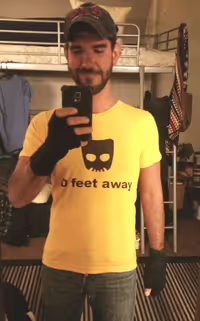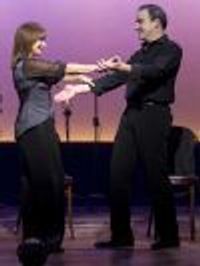Is the Company 2011 Philharmonic DVD still happening?
#100Is the Company 2011 Philharmonic DVD still happening?
Posted: 8/14/12 at 6:57pm
Yes, "us". All three characters I mentioned have stood the test of time. It can't be a coincidence that the role of Joanne single-handedly revived Elaine Stritch's career.
Yes, some of us take pleasure in Joanne's candor and, ultimately, brutal self-knowledge. Some of us also take pleasure in the sheer craft of one of the great lyrics written for the American stage.
Neither Joanne nor her solo represent all or even most women, so I have no idea why you find them misogynistic. As you will recall, it is Joanne's brutal candor that ultimately wakes up Bobby and solves the "problem" of the play; so in that sense, she is even somewhat heroic.
On the other hand, what is your beloved Dolly Levi but a stereotype of the underhanded, manipulative, overbearing female? Yes, it's all played for laughs and, like most comedies, turns out right in the end, but two can play the misogyny card if it must come to that.
Of course, Joanne and her song are fiction. That doesn't make either untrue.
#101Is the Company 2011 Philharmonic DVD still happening?
Posted: 8/14/12 at 7:16pm
Why bother, Gaveston? Why bother?
So...I thought about this on the subway, and realized that what I'm describing is my own process...my own history with the song. I've sung it a bunch of times at Sondheim concerts here in the city over the years, so I've lived with it and struggled with it for a while now. And how I enter a song (or scene or whole character, what have you) is to find the surprise. Now...that could be the surprise for the audience, me as the actor or the character. In my performance of the song, the beginning comes from a place of distance and judgement. And it continues down that path until the character finally comes to their 'aha' moment. The moment when they reveal themselves, perhaps without even meaning to. That doesn't undercut anything you've said in your interpretation. Your interpretation is perfect for another actor. But my attack on the song comes from a place of cock-sure judgment that comes from the distance I feel from those I'm mocking. As it goes along, after each judgment of each woman that this character knows, it becomes clearer and clearer just what kind of person the character is. And it's devastating. Add to that the realization that the group that came in for the most scorn represents something steady and eternal and something I'd never achieve. So the final 'rise's, instead of being a demand to acknowledge me, is a shocked admission that these women are what's going to outlast the rest of us. And attention must be paid.
After Eight
Broadway Legend Joined: 6/5/09
#102Is the Company 2011 Philharmonic DVD still happening?
Posted: 8/14/12 at 7:48pm
" but two can play the misogyny card if it must come to that."
Yes. But, in this instance, only one is right.
Me.
"Of course, Joanne and her song are fiction. That doesn't make either untrue."
Both are complete falsehoods, a misogynist's dream come true.
#103Is the Company 2011 Philharmonic DVD still happening?
Posted: 8/14/12 at 7:55pm
What are the falsehoods in the song, After Eight? Merely repeating what you said previously isn't additional evidence or argument.
"The Ladies Who Lunch" describes women in a relatively small social class. What makes you insist it is misogynistic? On the contrary, I find it full of compassion for women trapped by the social roles of the period and their class, even while the character herself tries to act as if she is above it all (an act which ultimately fails).
Updated On: 8/14/12 at 07:55 PM
#104Is the Company 2011 Philharmonic DVD still happening?
Posted: 8/14/12 at 8:00pm
Really interesting take on the character and song, Robbie!
And I, on the other hand, view it from a playwright's perspective, so it isn't surprising that we find different things in the number even as we agree on its quality. But I certainly agree with you about the "Ah, Ha!" moment, even if we understand the subtext differently.
May I ask a personal question? I've been assuming you are male from your hat, and I find the idea of a man singing the song very intriguing. But I realize I am only assuming. Are you male or female?
Either way, I wish I could have an opportunity to hear you perform the song.
After Eight
Broadway Legend Joined: 6/5/09
#105Is the Company 2011 Philharmonic DVD still happening?
Posted: 8/14/12 at 8:28pm
Is any explanation possible to a person who can't see what is plainly obvious to everyone on the planet? It's like being asked "why do you say the sky is blue?" Duhhh, are you serious?
Listen to the lyrics. Listen to a lyric like "too busy to know that they're fools." What kind of sentiment does that express?
Actually, don't bother. Even if you could understand, you clearly don't want to.
#106Is the Company 2011 Philharmonic DVD still happening?
Posted: 8/14/12 at 10:30pm
"too busy to know that they're fools"
I have a friend who is a somewhat more civil version of Joanne, but definitely a lady who lunches, only the 21st century version. A widow, she lives off the money she inherited from her wealthy husband.
Just this week, she sent me an email talking about how a mutual acquaintance was "wasting his life" and how she endeavors to fill every waking hour with new experiences.
Well, actually what she does is work her way frantically through the Zagat guide so that she can say she's been to every trendy restaurant in LA. She sees every play and musical, makes up her mind in the first 4 minutes, and walks out of 80% of what she sees.
She's a nice lady, but she doesn't actually create anything or accomplish anything of significance. She does no useful work. Yet she brags that her life is full simply because she packs each day with frantic activity of dubious consequence.
"Too busy to know that they're fools," indeed.
Joanne is talking about upper-class women, often highly educated but trained to do nothing of any importance. So they fill their hours with busy-ness to avoid facing the fact that their lives are empty. A foolish quest if ever there was one.
As I'm sure you know, this was the consequence for many women of means as American society tried to force women back into the home after using their labor during WWII. The 1950s (when the cast of COMPANY came of age) was one long decade devoted to conformity, especially where women were concerned.
So "too busy to know that they're fools" may be harsh, but it is true to the character, who is, she finally admits, talking about herself as well.
That phrase isn't the lyricist being mean-spirited, it's the character displacing her own unhappiness until she admits it toward the end of the song.
#107Is the Company 2011 Philharmonic DVD still happening?
Posted: 8/14/12 at 10:31pm
Gaveston,
I am, in fact, a man. I had to look down to confirm. ![]()
I've always been drawn to the song, and wondered how I could possible sing it. What was my hook? And the parallel I made in my life was all the different types (and stereotypes) of the gay men in this city. From the muscley Chelsea brunch queens to the East Village nerdy hipsters, I could draw a connection from what Joanne is describing to what I was living. At the time I started exploring the song, I'll admit that I was wallowing in jaded bitterness...for lots of reasons. Unhappiness in my career. Unlucky in love. And just a general feeling of otherness from a community I was supposed to be a part of. That was my way in. And it was really, really important to me that this wasn't an exercise in camp. And that is what I realized the 'Aha' for the audience would be. You hear those chords and see a man come to the mic, of course you immediately think of camp. But every time I sing it, I think it's my duty to invest as much as if I were cast as Joanne. And it's always fun to watch an audience figure out what they thought was going to be camp is turning into something that's committed and (hopefully) honest.
It's fun discussing the different ways people look at a song (or show) and how we can end up at the same destination, even if a different path is taken. And it's fun to re-articulate my process on a song that I've done for quite a long time. I'm hoping to sign it at another Sondheim event soon, and I'll take this conversation with me going forward!
#108Is the Company 2011 Philharmonic DVD still happening?
Posted: 8/14/12 at 10:38pm
I've really enjoyed the discussion, Robbie, and I love all the levels my mind's eye and ear imagine you bringing to the number. If you're ever performing in the L.A. area, please do let me know.
And you're absolutely right about differing roads leading to the same place. I would never demand an actor use MY subtext if he or she found a better way to get the most out of something I had written. Different jobs employ different methods, which is as it should be.
After Eight
Broadway Legend Joined: 6/5/09
#109Is the Company 2011 Philharmonic DVD still happening?
Posted: 8/15/12 at 7:22am
"She's a nice lady, but she doesn't actually create anything or accomplish anything of significance. She does no useful work.....
... nothing of any importance....
... their lives are empty ...."
Ha ha ha.
I love when people dismiss others as leading insignificant, useless, empty lives.
As opposed to engaging in such significant, useful activities as posting for hours on a chat board.
Isn't it rich?
So, yes, here's to the ladies who lunch!
As they really are, that is.
They live richer lives and are finer human beings than those who would mock them.
#110Is the Company 2011 Philharmonic DVD still happening?
Posted: 8/15/12 at 7:53am

#111Is the Company 2011 Philharmonic DVD still happening?
Posted: 8/15/12 at 10:43amI'd LOVE to hear Picard's LADIES WHO LUNCH. Not Patrick Stewart's. Picard's.
#112Is the Company 2011 Philharmonic DVD still happening?
Posted: 8/15/12 at 7:18pm
I love when people dismiss others as leading insignificant, useless, empty lives.
After Eight, if you will look again at my post, you will find that it was the friend to whom I referred who dismissed others for not achieving her own level of "significance".
I merely pointed out that the frenetic activity she wears as a badge of significance and discernment can look pretty hollow when viewed by a third party.
Obviously she also has other qualities or we wouldn't be friends. I merely used her as a handy example of the truth of the line, "too busy to know that they're fools", which you had questioned.
The fact remains that Joanne is talking about a generation and class of women who were over-educated for their assigned social roles as mere caregivers and companions while their husbands climbed the corporate ladder. Such women compensated in various ways, which Joanne details with considerable economy and, in her caustic way, even compassion.
#113Is the Company 2011 Philharmonic DVD still happening?
Posted: 8/15/12 at 10:30pmBut AfterEight has some odd personal insult connected to the song. When I mentioned the interesting article about the "Ladies who Lunch" in New York and how that scene doesn't exist the same way anymore, he said the article (which I don't think he read) was full of lies, that he often met with a group of ladies who lunch, and that somehow it all reverted back to how misogynistic I must be.
#114Is the Company 2011 Philharmonic DVD still happening?
Posted: 8/15/12 at 10:46pm
...AfterEight has some odd personal insult connected to the song....
What a shame. I think he's confusing the character's displaced sarcasm with the playwright's point of view, and that prevents him from seeing the very real compassion the writer has for his subjects (Joanne and the ladies of the song).
It's ultimately the compassion (along with the incredible craft) that has made the song a sort of "standard" in the theater/cabaret community, even as the habits of such ladies have changed.
The claim that Sondheim (and, presumably, his collaborators and admirers) are all bitter, commitment-phobic, women-envying-and-hating homosexuals is so 1967.
Updated On: 8/15/12 at 10:46 PM
#115Is the Company 2011 Philharmonic DVD still happening?
Posted: 8/16/12 at 12:32am
Except that that view is plainly obvious to everyone else on the planet, apparently.
For anyone who missed it, here's the rather entertaining article from Vanity Fair http://www.vanityfair.com/society/2012/02/ladies-who-lunched-201202
After Eight
Broadway Legend Joined: 6/5/09
#116Is the Company 2011 Philharmonic DVD still happening?
Posted: 8/16/12 at 5:49am
"he said the article (which I don't think he read) was full of lies."
I'll thank you not to put words in my mouth, especially false ones.
I said I knew all about the ladies who lunch since I've been having lunch with them in upscale NY restaurants for decades. I said your only knowledge of them comes from a song which represents a grotesque misrepresentation of them. The truth trumps misogynistic distortions.
I don't need any magazine article to tell me about the ladies who lunch. I know them firsthand.
And since you don't, you should refrain from passing yourself off as an expert on the subject. Or any subject, for that matter, other than mass market fiction, perhaps.
#117Is the Company 2011 Philharmonic DVD still happening?
Posted: 8/16/12 at 9:01am
Thrilled that we can now pre-order this on Amazon! Saw this live at Lincoln Center and what a treat. At intermission I was walking thru the bar area and said excuse me to an older gentlemen as I crossed in front of him to reach the other side of the room. I did a double take and realized it was the genius himself, Mr. Stephen Sondheim. He was in line to get a drink at the bar. I was speechless and star struck. Did not approach him, but was just delighted to be in the same room with him. "Company" is my favorite Sondheim show. Will love having this dvd!
http://www.youtube.com/watch?v=U_RJtM2PK7o
This isn't from the Lincoln Center production (it's from the Sondheim Birhday concert), but I love Patti's "Ladies who Lunch" on this dvd.
http://www.youtube.com/watch?v=4YTGGPcYIMM&feature=related
http://www.youtube.com/watch?v=kMwotYjG0Ak
#118Is the Company 2011 Philharmonic DVD still happening?
Posted: 8/16/12 at 10:13amBroadway Baby8, can you provide the Amazon pre-order link?
sondhead
Broadway Star Joined: 10/25/06
#119Is the Company 2011 Philharmonic DVD still happening?
Posted: 8/16/12 at 10:17am#120Is the Company 2011 Philharmonic DVD still happening?
Posted: 8/16/12 at 10:29am
Here ya go:
http://www.amazon.com/Company-Stephen-Sondheim-Patrick-Harris/dp/B008SBXFUU/ref=tmm_dvd_title_0
#121Is the Company 2011 Philharmonic DVD still happening?
Posted: 8/16/12 at 10:42amThanks. I had searched "Company new york philharmonic" on Amazon to no results.
#122Is the Company 2011 Philharmonic DVD still happening?
Posted: 8/16/12 at 6:28pm
And since you don't, you should refrain from passing yourself off as an expert on the subject. Or any subject, for that matter, other than mass market fiction, perhaps.
Whence comes this ritual where we bash Eric for actually doing research on subjects that interest him? When did that become a bad thing?! I don't believe HE has ever claimed to be an expert, but I find the breadth and depth of his knowledge rather extraordinary.
Thank you for the NY TIMES article, Eric. It repeats the theme we've been discussing here and the difference between the busy, working women of the upper classes today and the enforced idleness of their mothers.
After Eight, if you spend as much time at luncheon as you claim, it's no wonder you prickle at perceived criticism of the idle rich! But Joanne and her ladies aren't being knocked; they simply had very few choices. One hopes things are different now.
#123Is the Company 2011 Philharmonic DVD still happening?
Posted: 9/3/12 at 8:51pm
Jonn Hamm should play Bobby!
Very nice idea. But is he too old?
#124Is the Company 2011 Philharmonic DVD still happening?
Posted: 9/4/12 at 4:35pmI don't think so. 40 is the new 35. Question is can he sing it?
Videos









